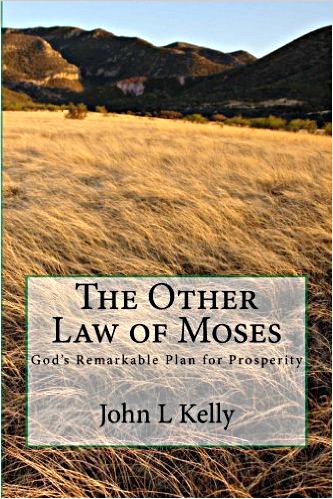Five years after the publication of Peorian John Kelly’s “The Other Law of Moses,” the 250-page paperback seems as relevant as ever. Progressive populist Bernie Sanders talks about income inequality and college debt; conservative populist Donald Trump rails about overpriced prescription drugs and the need to raise taxes on the rich.
This month, people celebrate Purim starting at sundown March 23, recalling Jews’ deliverance from Persia, and it’s tempting to reflect on ancient wisdom even as some feel the need for humanity to be delivered today, from despots or financial systems.
Subtitled “God’s Remarkable Plan for Prosperity,” Kelly’s book reexamines the Bible from an economic perspective, pointing out that the Ten Commandments were a foundation upon which other meaningful rules were established. Kelly calls one God’s “Land Law,” affirming that the land was God’s, and people used it under certain conditions but didn’t hold “title” to it. All tribes were granted use of land based on its productivity, except for the Levites, who had rotating priestly (and commercial) duties.
“Land Law” was unique for a place surrounded by kingdoms. It provided five elements that served Israel for centuries, off and on: equality for all, including the principle of inheritance; the Sabbath day of rest; the Sabbatical year every seven years, when land lay fallow and debts were cancelled; the Jubilee year every 50 years, when slaves were freed and land unworked, and debs forgiven; and tithing 10 percent of one’s earnings for using God’s land. This was used by Levites to live and build temples and civic projects.
Clarifying and interpreting the Old Testament, the author, a local financial adviser, explains and summarizes often-confusing references. He shows that Israel some 3,000 years ago became Earth’s first “middle class” country, with no taxes on labor or property, shared prosperity, and provisions to care for widows, orphans, the disabled and ill. Debt was seen as a temporary inconvenience considered dangerous since it could lead to a loss of freedom. The absolute loss of freedom – slavery – was considered an occasionally necessary evil to be limited. Both were rare when the Land Law was followed, when leaders were chosen on merit, not lineage or power.
When the Land Law was obeyed, times were good; when it wasn’t, society was impoverished or worse.
This land concept isn’t outlandish. Native Americans held similar views about property and land. Massasiot – leader of the Wampanoag people in New England in the 1600s – said, “What is this you call property? It cannot be the Earth, for the land is our mother, nourishing all her children, beasts, birds, fish and all men. The woods, the streams, everything on it belong to everybody and are for the use of all.”
Despite the Land Law’s success for hundreds of years, the Millennia weren’t all milk and honey. The Land Law was repeatedly degraded and reformed, abandoned and restored. Kings were named or invaders were suffered; Jews were persecuted from without and corrupted from within. Sometimes “the average Jew was oppressed not only by his country’s occupiers, but also by those religious legalists within his own community,” Kelly writes.
When the Land Law was discarded, economic injustice occurred and was criticized by prophets such as Amos, who blasted “exploiting the weak and ill-treating the poor.”
Moving through the New Testament – and putting into economic context the Beatitudes – Kelly recognizes elements of the Land Law in the Jeffersonian ideal of an agricultural near-Utopia, and links it to modern tax policies, which he sees as generally harming prosperity and contributing to cities’ deterioration.
No advocate of theocracy, Kelly still suggests, “All taxes on labor and capital should be abolished. The community has no moral claim to a person’s labor or capital. Under the Land Law, the tithe – rent paid for the [use] of God’s land – provided all the support needed for the community’s civil needs.”
Quoting Jesus scolding the Pharisees, Kelly inadvertently reminds us of contemporary voices, from Pope Francis to Cornel West: “You hypocrites! You pay your tithe … and have neglected the weightier matters of the Law – justice, mercy, good faith.”
The book is available at select bookstores and online.
